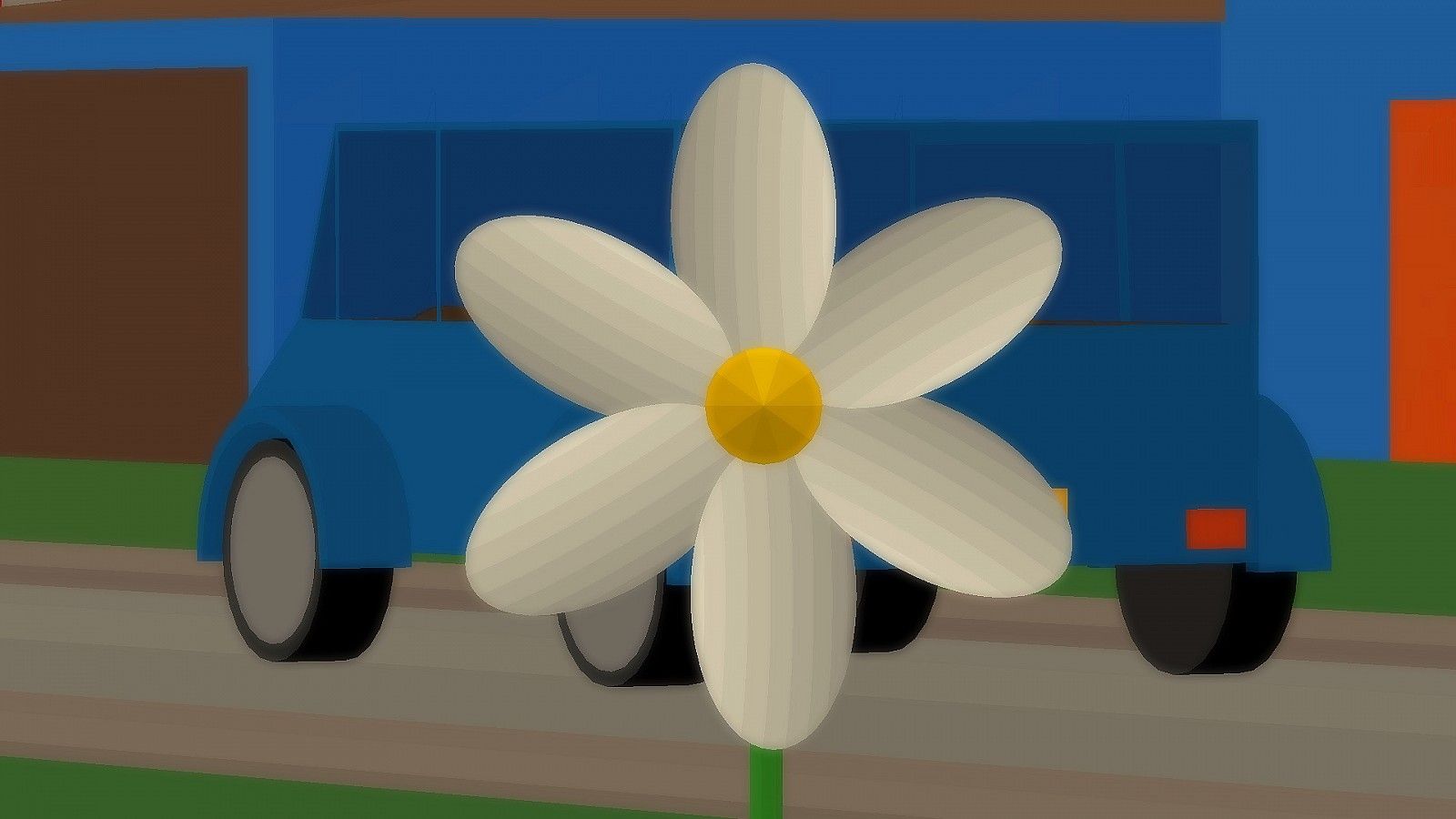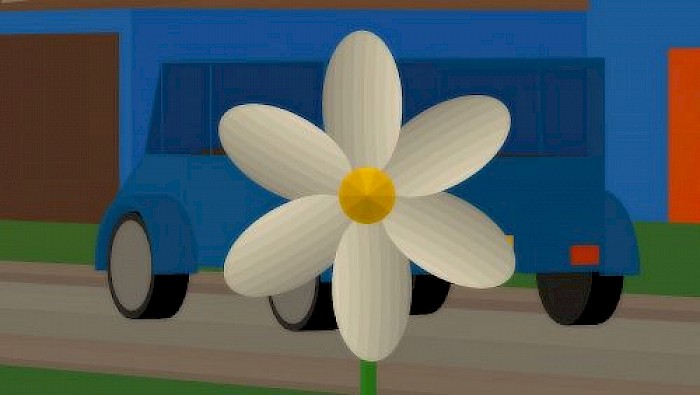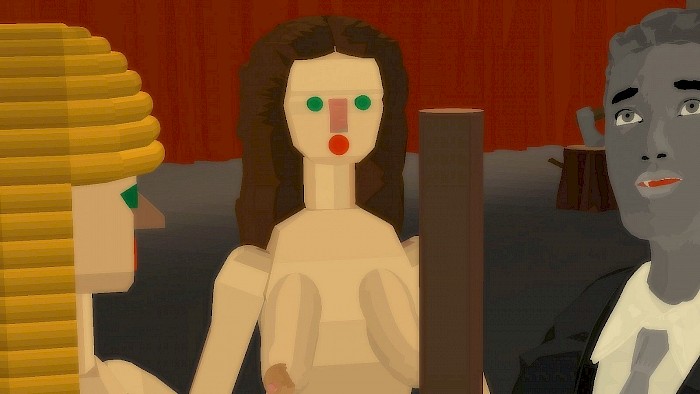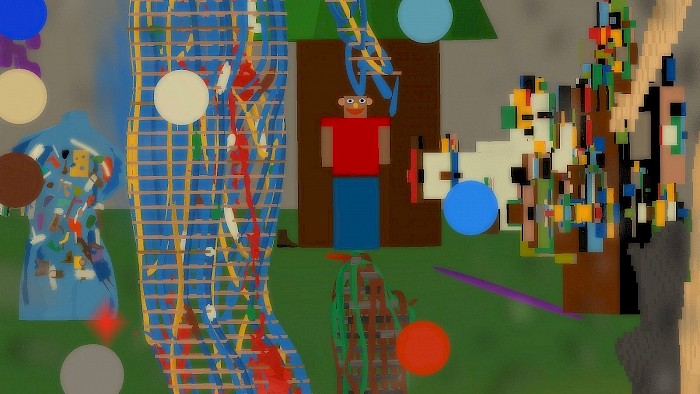Shown in [ANNULÉ] Compétition #8.
Synopsis
Distracted Blueberry follows a performance art band through a series of poetic encounters. Masculine tropes are undone to form a relationship between male sexuality and the human death drive. The body, violence and humour are positioned in the larger context of nothingness and somethingness, bridging a tension between externalized anxieties and the terrors of nature.
Text from the selection committee
This monumental work by Canadian artist and filmmaker Barry Doupé presents itself to us as a (very) long session of masturbation, perhaps under psychotropic drugs, with all that such sustained activity could induce at the cerebral level: totally improbable associations, mental drifts, total loss of spatio-temporal landmarks and an unbounded freedom of content. A bit like entering the Black Lodge of Twin Peaks subverted to cartoon porn. Distracted Blueberry is one of those films that show animation as the ideal cinematographic technique to experience worlds where absolutely everything is possible, and where the technique is no more than a vector subject to the sole freedom of the mind.
Plastically, the film is in a borderline game of experience with the representation of the obscene, and uses the countless fluids that populate its film (blood, semen, shit, piss and food) as real materials, which are spread out on the screen like a digital dripping. The staging, for its part, borrows a lot from fiction and television language, even from soap opera, creating a strange uneasiness in the viewer: while what appears on the screen is sometimes beyond comprehension, the framing, camera movements, and editing rhythm contribute to making this representation intelligible, almost trivialized, and sometimes very funny, creating what could be considered as a camp film of a new era, entirely digital. While this borrowing from television drama makes the film extremely dynamic, it is emptied of any fictional content that could create any suspense or narrative expectation: the repetition and slowness of the gestures, as well as the disembodiment and apathy of the puppet characters contribute to creating a strange distance from what is happening on the screen. The film is never cold, however, because the stereotypical bodies that populate the film constantly remind us, like certain video game characters, of the extreme solitude of our increasingly digital and disembodied existences.
Translation made by the translator www.DeepL.com/Translator
– T.D.
Documentary
Critic
Distracted Blueberry follows a performance art band through a series of poetic encounters. Masculine tropes are undone to form a relationship between male sexuality and the human death drive. The body, violence and ribald humour are placed in the larger context of nothingness and somethingness, bridging a tension between externalized anxieties and the terrors of nature. Evocative of inner emotional states, strange landscapes existas reflections of our collective dreams and nightmares.
In the opening scene of Distracted Blueberry, which lasts a scant seven minutes, an all-male quartet plays musical instruments with their penises. The pianist cuts off half of his penis with a large knife. Blood spurts everywhere. An audience member begins to ejaculate, spontaneously, endlessly. The pianist picks up his severed cock and begins to fuck himself with it, while banging his head on the piano keyboard. The audience member crawls onstage. The pianist fucks himself with the knife. Blood is flowing, spurting. The audience member crawls away. We’re not sure if he’ s horrified or not, until he be gins ejaculating again, a fountain of cum, the semen covering his face and chest. The pianist begins to fellate the knife. The camera swirls around him as blood pours out of him, mou th, anus, dick.
Is this funny? Well, not exactly. Horrifying? No, not horrifying. Sexy? Maybe a little. Transgressive? After Distracted Blueberry, I no longer know what transgression is. Dreamlike? Yes, of course, though as the video goes on it becomes less and less like a dream and more and more like its own world.
Watching Distracted Blueberry is like being submerged into a tank and not being able to tell the temperature and salinity of the water-or whether you are even in water or some other, as yet unnamed, liquid. You are in a highly charged, yet strangely neutral, suspension. And you need to be there for the entire 4.5 hours (though it may take multiple sessions).
Affect is bracingly high: disgust, shock, laughter, beauty, suspense, titillation. At the same time, impossibly, affect is also soothingly low: distant, ambient, humming. As if Sadean transgression were presented with the inexorably meditative pace of a Morton Feldman composition. And then there’s the dialoguesometimes cryptic, often philosophically poetic, often funny, occasionally merely silly, though always beautifully written, like goofy John Ashbery shot through (much more than he already is) with the wit of Oscar Wilde.
This is what I wrote Lilli Carré a few months ago: “New Doupé! It is something else: 4.5 hours of relaxing transgressive mayhem. I’m going to try and write aboutit.” And so here is my first stab at it. I find the work enormously compelling, yet I can’t quite articulate why. Although it feels entirely Doupé, it also feels prescient. Prescient like dynamite about to blow up the dam and leave us flooded with new possibilities, drowning happily.
– Steve Reinke (Antimatter Festival catalogue, 2019)



